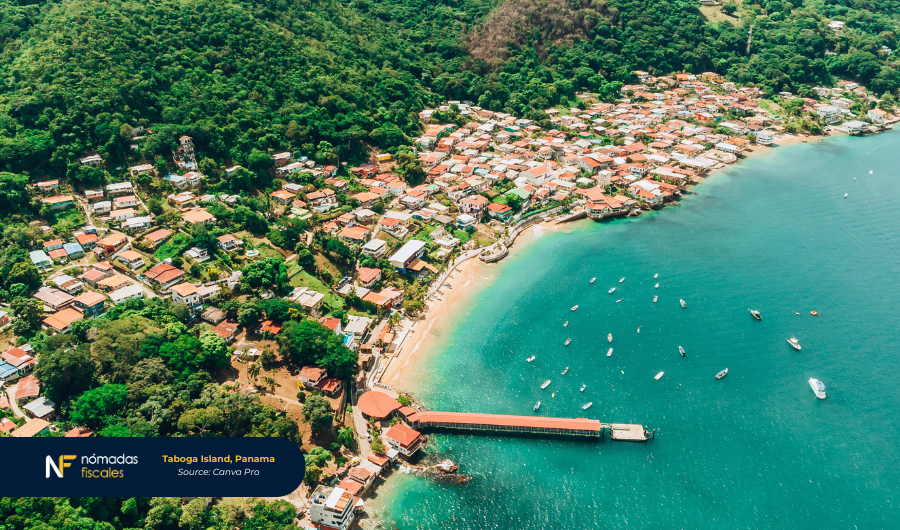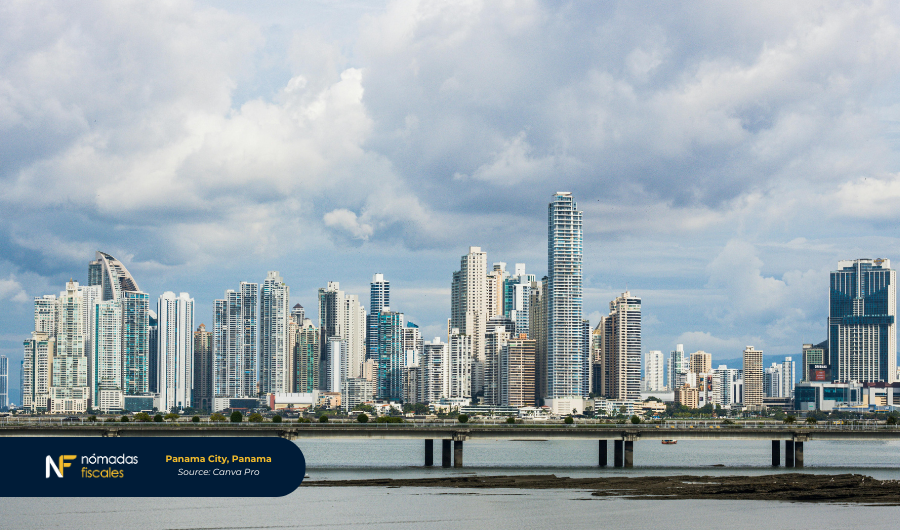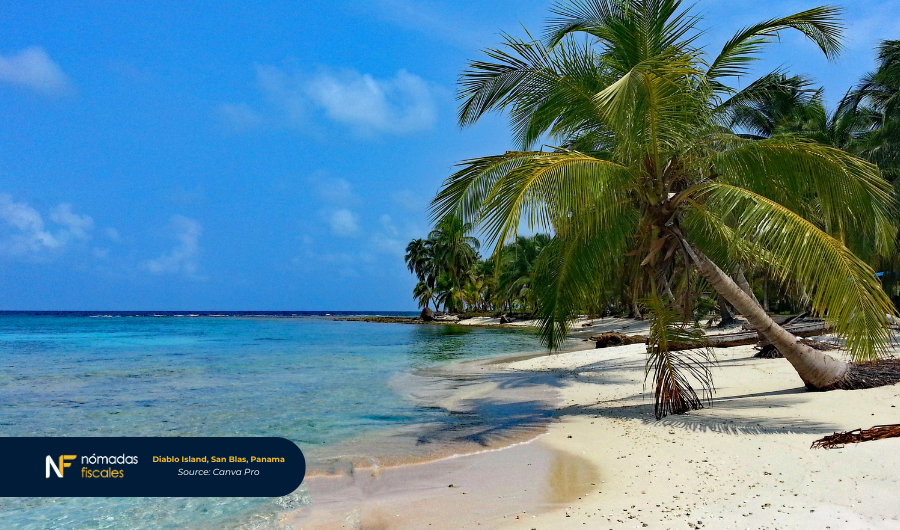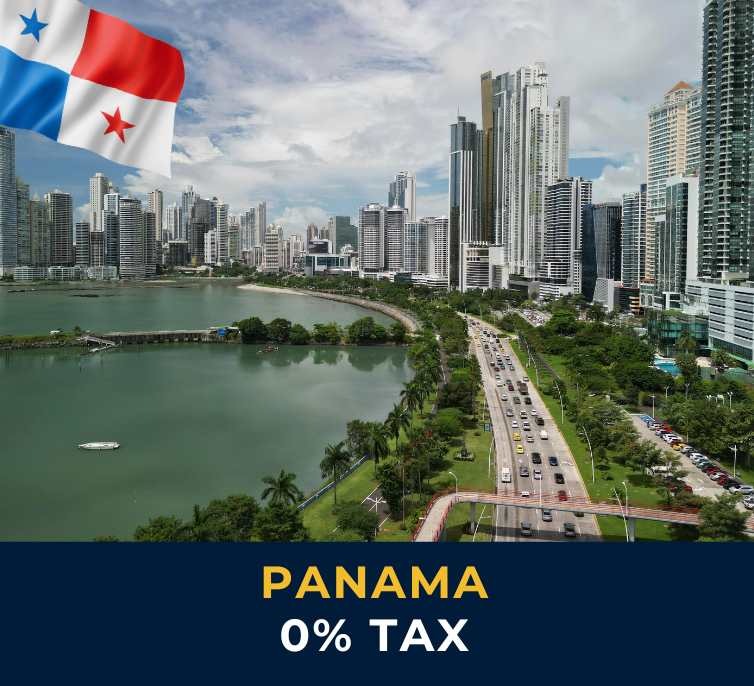Panama is well-known in the international tax sector (even more so with the Panama Papers scandal) and also by thousands of Americans and Canadians who see the country as an ideal destination.
This is because Panama has a bit of everything: good weather, coastal areas, mountains, a vibrant capital, affordable cost of living… and very low taxes!
If you have doubts about how Panama or Panamanian companies can help you pay lower or zero tax, you have come to the right place because we are going to analyze it in full.
What is the taxation in Panama?
With Panama, we are once again dealing with one of our beloved jurisdictions with a territorial tax system.
As a tax resident in Panama, you will only be subject to taxes on income earned from Panamanian sources.
This would make it possible to live in the country for as long as you want, paying zero percent taxes as long as your activities and income are outside of Panama.
This condition also extends to its companies, which we will talk about later.
Moreover, as is customary in tax residencies Tax Nomads like, Panama has no wealth, inheritance or gift tax.
Cryptocurrencies are also tax-free, enjoying a 0% rate.
The Personal Income Tax in Panama (which, as mentioned, only applies to income from Panamanian sources) is also not high and follows a progressive scheme:
- 0% up to $11,000
- 15% between $11,000 and $50,000
- 25% above $50,000
Another great advantage of Panama is that we can achieve a double zero percent tax (Personal Income Tax + Corporate Income Tax) by using tax-free offshore companies, as it has no CFC (Controlled Foreign Company rules).
However, not everything can be positive, and there are two aspects that should be carefully reviewed before incorporating Panama into a tax strategy:
- Few Double Taxation Treaties, specifically 17, so it is advisable to analyze the origin of the income to avoid any surprises.
- Although Panama is no longer considered a tax haven according to Spain, it remains on the European Union’s list of non-cooperative jurisdictions, a fact that can pose significant limitations to some tax strategies.

Company registration in Panama: taxes and requirements
Panama is especially known for its offshore companies, which offer both tax advantages and privacy.
As mentioned earlier, territorial income rules also extend to corporate taxation, making it possible to pay 0% taxes through a company in Panama with economic activities outside the country.
As long as the income comes from foreign sources, it doesn’t even have to be declared to the Tax Authority.
Moreover, Panama is popular for its privacy, with strict banking secrecy laws and corporate books.
These types of companies enjoy complete protection under Panamanian law regarding their assets and accounts, ensuring that third parties cannot access details about their business and assets.
Ownership can also remain anonymous, as it is possible to appoint nominee directors.
Business registration in Panama can take as little as one week, with the advantage of no minimum capital required for its formation.
Types of Visas / Residency in Panama and Requirements
In light of the above, you are probably interested in becoming a tax resident in Panama, but to do so, the first step is to legally reside in the country.
In this regard, as with most destinations, there are various immigration options, but let’s analyze the most interesting ones:
Digital Nomad Visa (short stay) in Panama
Perhaps the best option for those who want an initial experience with temporary residency in the country (1 year, renewable for a second year).
Is known popularly as Panama’s Digital Nomad Visa, but its true name is “Short Stay Visa for Remote Workers.”
Its main advantage is that the requirements and characteristics do not commit you as much as other longer-term residencies. Among them, we find:
- Ability to generate online income.
- Demonstrate income of over $3,000 per month.
- Provide contracts with foreign entities.
- Does not allow dependents; it must be applied for individually.
- Affordable price starting from $250.
Residency through the Panama Friendly Nations Visa
It’s one of the best residency options for those looking to make Panama their long-term destination.
Designed for citizens of the +50 countries on Panama’s Friendly Nations list, it offers a pathway to permanent residency, work, and investment in Panama.
Applying for this Visa initially grants a 2-year temporary residency, which can be converted to permanent residency in the last month of those 2 years.
However, the requirements this time around are much more demanding, with three avenues to obtain it:
- Deposit at least $200,000 in a fixed-term national Panamanian bank account.
- Real estate investment of at least $200,000 in Panama.
Residency by Company Formation in Panama
Another popular way for citizens of countries on the Friendly Nations list to obtain residency in Panama is through the establishment of a company with economic activities in the country. This option has gained traction among those interested, as it is a faster and more affordable process compared to other alternatives, such as investing in real estate or making bank deposits.
The key here is that, although the company must be legally registered for this purpose, it is not necessary for any actual or active economic activity to be conducted within Panama.
This process can be carried out quickly, and its cost is significantly lower than traditional investment options, making it the preferred route for most tax nomads.
Residency through the Red Carpet Visa or Golden Visa in Panama
The best option for citizens who are not part of Panama’s Friendly Nations list or who desire a direct pathway to permanent residency with a slightly larger investment in the country.
You can obtain it by:
- Investing $500,000 in real estate (for a limited time, it’s possible to do so for only $300,000).
- Investing $500,000 in bonds or shares of Panama.
- Depositing $750,000 in a Panamanian bank.
Residency through the Retirement Visa in Panama
One of the lesser-known options that will be pleasing to pensioner Tax Nomads (an increasing percentage of our clients) is the retirement visa in Panama.
Its main requirements include demonstrating a minimum lifelong income of $1,000 per month, which can originate from Social Security or other state retirement funds, as well as private pension systems.
In addition to the advantages that fiscal residency in Panama offers per se, this visa includes other benefits such as:
- Discounts between 25-30% on public services, airplane tickets, and other transportation.
- Discounts between 30-50% on hotels, cinemas, cultural and sporting events.

Citizenship in Panama: Naturalization and Requirements
On paper, it’s possible to obtain citizenship in Panama through naturalization once you have completed 5 years with permanent residency in the country, or 3 years if married to a Panamanian citizen or through reciprocity with Latin American countries and Spain.
However, although Panamanian citizenship is known as a “simple” option to obtain a second passport, this situation has changed in recent years.
More and more people are encountering difficulties in obtaining this passport in practice, sometimes taking more than 10 years.
That’s why we don’t consider citizenship as one of the strongest arguments for choosing Panama; rather, it should be considered as an “extra” to consider if planning to reside in the country for a very long time.

Panama Tax Residency Review
As we mentioned at the beginning of the article, Panama enjoys our favorite tax system, the territorial.
This places it directly at the top of our options for tax residency, and, if applicable, also for the opening of offshore companies and as a key link in tax structures.
The only downside we can find in this residency is the somewhat demanding requirements if we consider residing long-term.
For this reason, it enters into direct rivalry with other territorial systems such as those of Paraguay or the Dominican Republic, to be the chosen option according to the profile and preferences of the Fiscal Nomad.
However, at the corporate level, there is no possible criticism of the proposal offered by Panamanian companies.
Are you interested in obtaining residency or setting up a company in Panama?
Or would you prefer a complete analysis of your situation to discover the best option for you?
In either case, we can help!
Simply request your FREE INITIAL CONSULTATION BY CLICKING HERE, or contact us directly via WhatsApp or through the form below.
Contact us
In Panama, taxes are governed by a territorial income tax system, which means that only income obtained within the country is taxed. The main taxes are:
Personal Income Tax:
- It applies only to income from Panamanian sources.
- Progressive rate: 0% up to $11,000, 15% between $11,000 and $50,000, and 25% above $50,000.
Wealth, Inheritance, Estate, and Gift Tax:
Panama does not have taxes on wealth, inheritance, estate, or gifts.
Cryptocurrencies:
Cryptocurrencies are tax-free and enjoy a 0% rate.
Corporate Tax:
Offshore companies operating outside of Panama can achieve a 0% tax rate, and Panama also does not have Controlled Foreign Corporation (CFC) rules.
Opening a company in Panama costs between 1,000 and 2,500 dollars.
The price varies depending on the type of company being established and the activity you wish to undertake. This range includes registration costs and associated fees, which may fluctuate based on additional services and specific requirements for your business.
Company registration in Panama offers several advantages:
- Territorial Income Tax: Only income from Panamanian sources is taxed. Foreign income is exempt and not declared.
- Privacy and Banking Secrecy: Strict laws protect business details and assets.
- Ownership Anonymity: Ownership can be kept anonymous through nominee directors.
- Speed and Ease: A company can be established in approximately one week with no minimum required capital.
- Absence of CFC Rules: There are no additional tax restrictions for offshore companies.
In Panama, there are different types of residency available for individuals with various objectives:
- Digital Nomad Visa: Ideal for temporary stays of remote workers (generating a minimum of $3,000 USD per month).
- Residency through Friendly Nations Visa: For citizens of certain countries who wish to reside in Panama (with an investment of $200,000 USD or employment in a Panamanian company).
- Residency through Red Carpet Visa or Golden Visa: Aimed at those seeking permanent residency through investments (starting from $300,000 USD).
- Retirement Visa: Designed for retirees with minimum monthly incomes of $1,000.
Each option has specific requirements and offers different benefits, from temporary stays to permanent residency, depending on the individual needs of the applicant.
To obtain Panamanian citizenship, there are several pathways, with the most common being naturalization.
The requirements include having permanent residency for at least five years, three years if married to a Panamanian citizen or by reciprocity with certain Latin American countries and Spain.
However, it is important to note that the process can take several years and is not always guaranteed, as regulations may change, and there are cases of significant delays in practice.

